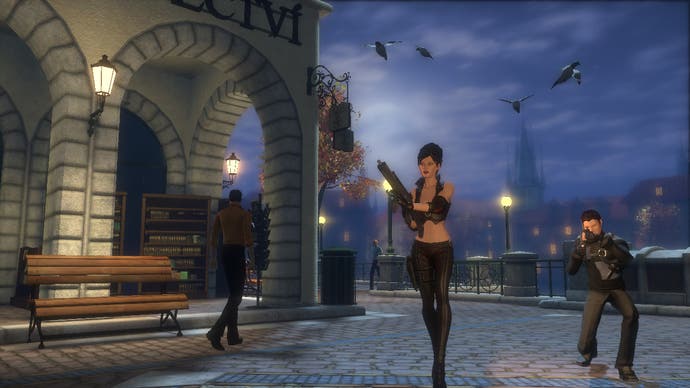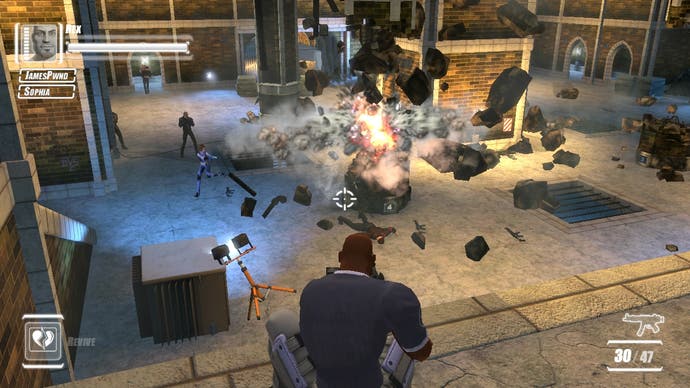The Agency
An agent of change.
They'll slot into four basic roles - combat, stealth, support and the additional "social" type. Some provide in-mission support (in the demo, a cellphone symbol pops up over a pipe that an operative tells us he can blow up, causing a distraction; another example would be a remote sniper), while others might be able to craft items or gather intel for you while you're offline. Social operatives might be tied into mission design or do something as basic yet valuable as filing expense reports to generate cash. There will also be "unique" operatives you don't own, story characters who join you for a limited period. While the majority will exist as abstracted collectors'-card graphics, some will have actual avatars in the world.
As intricate as this system is, the Seattle studio is elaborating it yet further. Some missions might require operatives to be sacrificed; they also have morale ratings you'll need to manage by sending them on R&R (although that in itself has its dangers in the spy world). They might have recruitment criteria based on the CIA's MICE system for turning enemies into double-agents (money, ideology, coercion and ego, if you were wondering). Operatives also have their own stats, including such personality data as their blood type, star sign and whether they tend towards good or evil. These will trigger a series of side-stories as operatives in your roster fall out and need to be let go, or made to settle their differences.

If you opt to allow it, operatives will also be able to contact you out of the game, by SMS and email. SOE has some plans for the out-of-game experience that it's keeping under wraps, but Milton and Wilson let slip some tantalising details. Some 60 organisations from the game world will have a presence outside of the game itself (websites, we'd guess), and there will be a web client that allows you to log in and check your mail and operatives' progress from any internet terminal. And although they're not able to support cross-platform play at launch (despite having it working in the office), they do promise that any account will be playable from either or both the PC and PS3 versions of the game.
A hundred-hour-long massively multiplayer shooter with hundreds of guns, RPG character advancement, a character-collection meta-game, rule-breaking design and sophisticated non-combat gameplay... It's hard to tell what's more surprising, the extent of SOE Seattle's ambition, or the focus and easy confidence with which it seems to be going about making that ambition a reality.
Although the need to generate such a vast amount of content and ensure the game scales well on PC means it's not the most graphically lush title, it has more than enough clean-cut, sharp-edged vivacity in the visuals to make up for that, as well as some outstanding effects. (The effects artist worked on Call of Duty 4 and is "actually pretty inspiring," says Milton. "That man will talk to you for an hour about a muzzle flash and make it a revelatory experience, it's just this transcendent thing to him.") The interface is pleasantly clean and simple too, with a heavy emphasis on contextual actions to make it playable on a pad.

As far as the social structure, character progression and online game design is concerned, it hardly needs adding that The Agency distinguishes itself with ease - this could very well be a game that changes the way things are done in the MMO space, and indeed outside it. With the game straddling the complexity and immersion of a full-scale MMO and the more manageable, session-to-session playing style of the likes of Battlefield Heroes - as well as presenting perhaps the most viable MMO on consoles to date - SOE Seattle is having its cake and eating it with aplomb.
If there's a concern at this stage, before we've tried it hands-on, it's simply how well the game will play as a shooter - an area in which this studio of MMO veterans is far less experienced. If it doesn't have the right tactile kick to the guns, the right level design, the right controls, all this work will be for naught. We seriously doubt that will happen, but we'll be waiting with bated breath to find out.
In the meantime, be sure to check back tomorrow for more on The Agency, in our extended interview with Milton and Wilson.


.png?width=291&height=164&fit=crop&quality=80&format=jpg&auto=webp)




.jpg?width=291&height=164&fit=crop&quality=80&format=jpg&auto=webp)
